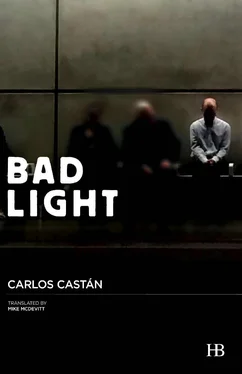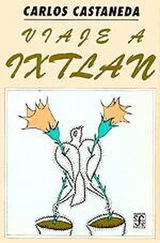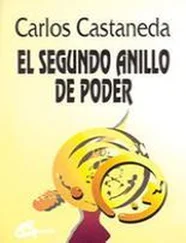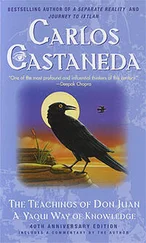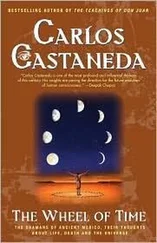Carlos Castán - Bad Light
Здесь есть возможность читать онлайн «Carlos Castán - Bad Light» весь текст электронной книги совершенно бесплатно (целиком полную версию без сокращений). В некоторых случаях можно слушать аудио, скачать через торрент в формате fb2 и присутствует краткое содержание. Год выпуска: 2016, Издательство: Hispabooks, Жанр: Современная проза, на английском языке. Описание произведения, (предисловие) а так же отзывы посетителей доступны на портале библиотеки ЛибКат.
- Название:Bad Light
- Автор:
- Издательство:Hispabooks
- Жанр:
- Год:2016
- ISBN:нет данных
- Рейтинг книги:5 / 5. Голосов: 1
-
Избранное:Добавить в избранное
- Отзывы:
-
Ваша оценка:
- 100
- 1
- 2
- 3
- 4
- 5
Bad Light: краткое содержание, описание и аннотация
Предлагаем к чтению аннотацию, описание, краткое содержание или предисловие (зависит от того, что написал сам автор книги «Bad Light»). Если вы не нашли необходимую информацию о книге — напишите в комментариях, мы постараемся отыскать её.
Carlos Castán
Bad Light
Bad Light — читать онлайн бесплатно полную книгу (весь текст) целиком
Ниже представлен текст книги, разбитый по страницам. Система сохранения места последней прочитанной страницы, позволяет с удобством читать онлайн бесплатно книгу «Bad Light», без необходимости каждый раз заново искать на чём Вы остановились. Поставьте закладку, и сможете в любой момент перейти на страницу, на которой закончили чтение.
Интервал:
Закладка:
They don’t let you see the scene of the crime, but nobody takes the trouble to give the place a decent clean, either, and the bloodstains remain on the wall, untouched, a dreadful continent surrounded by brown islands on a vertical stucco sea. They must have scattered plenty of sawdust of the floor, for there were still lumps stuck to the baseboard on the day I decided to make use of the set of keys Jacobo had handed me some time previously and I made the decision to enter his apartment. About one week after the crime. At first glance, everything had been left more or less as I remembered it. His children and his ex-wife had dropped by no sooner had the police removed the seal from the door and business as usual had been declared on the landing. They took with them a couple of Pepe Cerdá paintings, said to be worth some cash, his old Underwood typewriter, which weighed half a ton and had been at one and the same time his emblem and his pride and joy (when this last fact dawned on me, I could not help but feel a twinge of resentment, for I had set my heart on that beauty, nor, at that precise moment, could I help but consider myself a wretched soul), as well as anything else of value they could find in the drawers following a quick skim through their contents: the gold watch he never wore, his collection of fountain pens, and not much else as far as I could tell, perhaps one or two of the bottles of wine left lying around, so temptingly, for all to see, though they didn’t even have the good taste to choose the finest among them. They had told me over the phone that they’d be back soon, as soon as they could all coordinate their schedules a little, to see what was to be done with the books and all the rest, so that they could strip the apartment as quickly as possible, since it was rented, the meter was still running, and it wouldn’t do to carry on paying month after month without rhyme or reason. In theory, the idea was to pack it all up in boxes and take it off to some temporary spot with enough room for it all, the house they owned in his hometown, no doubt, so as to sort through it all more calmly at some later date when they had the energy and some time on their hands. I pictured that heap of crates loaded on board a white van, heading for the country, before gathering dust in the woodshed of some ramshackle, cobweb-filled house, next to the farm tools, the rusty scythes, the foul-smelling clay pots, and the discarded wineskins, the tape sealing Jacobo’s watercolor prints, his books, his love letters, his toy soldiers, a whole life packed away inside cardboard boxes and sprinkled liberally with rat poison.
8 (condolences)
The wake prior to the incineration was held in the rooms of the Torrero cemetery. If Jacobo’s family had decided to bury his remains rather than burn them, they would have done so in his hometown. It matters not that he had made the decision some time ago to distance himself from that place and return to it as little as possible. This is a common state of affairs. As soon as someone has definitively lost any chance of making themselves heard or protesting, everyone else acts as they see fit. I’ve even seen sung masses, the choir packed with angelical children, to send off the most steadfast of nonbelievers, in the epicurean belief that death, like anything else, remains the preserve of the living. Perhaps it would not have been such a bad thing if Jacobo’s remains had come to rest in the place he had spent so many years, no matter how often he had bad-mouthed the lovely Provincia and all its kindhearted folk who had fashioned a whole sophisticated system for whiling away their time out of snooping on others, speaking ill of their fellow men, and leaping to conclusions. It was, when all is said and done, for better or for worse, where his home was. And a home, an abode in the broadest sense of the word, need not always as a matter of course be the place where one lives, it can also stand for just the opposite, the place from which one is determined to beat a retreat, the little flag with a pin for a mast stuck into a point on the map, signaling, on the one hand, the place where, by dint of centuries and fate, the exact makeup of your own blood, blend after blend, has slowly been concocted, and on the other, the reference point thanks to which one can make a getaway, letting, as is only right, a little air, the rivers, and even, if possible, the sea currents come between you and it, to flee and never to go back; for even if you are never to return, you need a place to which you never return, precise coordinates that mark the spot on which you have decided to set up the ghostly camp of your absence, the chair on which you do not sit, the walls you do not hide behind, the steps you do not take, and the thousands of eyes that do not pin you to the spot.
Quite a throng had gathered in the corresponding room of the funeral parlor, for the most part people whom I knew Jacobo had despised with all his heart. Yet there they were, sobbing occasionally, inventing exploits and memories, embracing one another as and when they arrived, heading outdoors in pairs for a smoke. Whenever someone dies, a sort of public battle over grief breaks out immediately. Among the deceased’s acquaintances, there are three or four who vie with one another to see who was his truest, closest friend and, by extension, who is most entitled to feel distraught and to be on the receiving end of the most heartfelt condolences. This contest is not always fought on the surface; one must follow it between the lines, in demeanors and conversations. The candidates focus their efforts on rebuffing and clamping down on any attempt to lighten the mood, frowning on all those feeble stabs at humor that are inevitably always made among those gathered together, as a way of letting off steam, seeking solace in the thought that the one who is no longer with us would have been a thousand times happier to see us laughing than to know we are this crestfallen, or something along those lines, or proposing a toast, sometimes even going so far as to perform the time-honored farce of filling a shot glass for him, amid nervous laughter and tears, before belting out his favorite song at the top of their lungs. The candidates refuse, under any circumstances, to play along, and will if they can prevent the rest from doing so, for it turns out that they, unlike the others, are grieving for real, and are in need of consoling, a little more attention, the heartfelt kisses of the others’ girlfriends, if possible, and even for one of those girlfriends to refuse to leave them alone when night falls — you guys go ahead if you like.
Without ever saying so in quite so many words, the candidates’ quarrel essentially comes down to two things, always the same two: how close they were to their lost friend and how recent and meaningful their last encounter was. This was what three of the frontrunners were squabbling over when I made my entrance in the room.
“It’s unbelievable, not a week has passed since I last spoke with him.”
“Four days, in my case.”
“Two in mine. In fact it was he who called me. He needed to talk. He seemed, how can I put this, strange, and believe me, I know him well.”
A civil war. The dead man being dead and therefore out of the running, for the spoils that go to the deceased are a prize that belongs to a different plane, the one singled out as his closest friend will for once take his place, before a far from sparse crowd, as the protagonist of something big, something serious and even solemn, and not without a certain degree of social cachet, no matter how fleeting. I’d have liked to wander over and tell them that their quarrels were unwarranted for I knew for a fact, based on plenty of conversations with Jacobo, that he had nothing but the deepest contempt for the three of them in equal measure, without further distinction, and that the absolute, utter indifference he felt toward each of them was matched only by that he felt for the other two.
Читать дальшеИнтервал:
Закладка:
Похожие книги на «Bad Light»
Представляем Вашему вниманию похожие книги на «Bad Light» списком для выбора. Мы отобрали схожую по названию и смыслу литературу в надежде предоставить читателям больше вариантов отыскать новые, интересные, ещё непрочитанные произведения.
Обсуждение, отзывы о книге «Bad Light» и просто собственные мнения читателей. Оставьте ваши комментарии, напишите, что Вы думаете о произведении, его смысле или главных героях. Укажите что конкретно понравилось, а что нет, и почему Вы так считаете.
